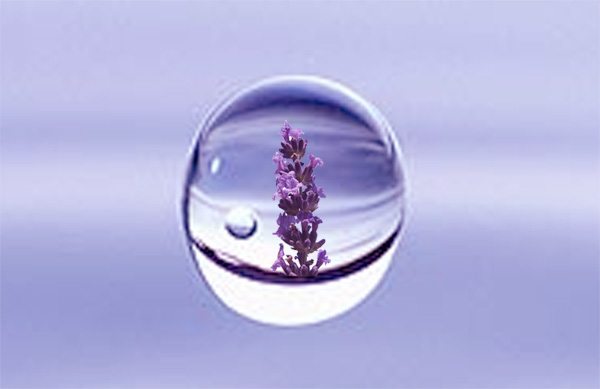(An On-going Oils Project!)
A Rose By Any Other Name….
There are many terms applied to oils & confused clients often ask me what they mean. What are enrichers, carriers & base oils? What is the difference between an essential oil & an absolute? Refined, raw, virgin, solvent extraction, expressed oils – what do these terms actually mean when you are buying an oil so that you can make an informed choice? For example, you would think that ‘cold pressed’ would mean an oil produced without any heat – but this is not the case! (For more about this, look at the section on Extraction Methods).
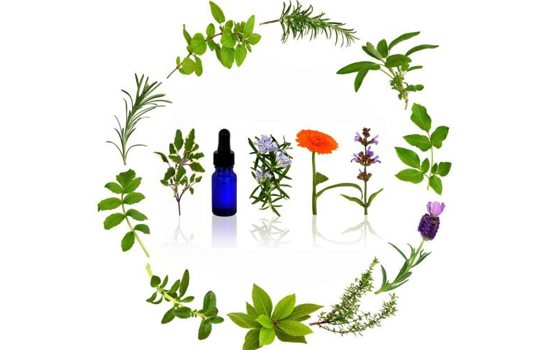 Whether you want me to create a product for you, make one yourself, know why one product is more expensive than another, if it really is a bargain, or simply understand exactly what it is you are smoothing onto your skin or hair, here is a little glossary of terms for you 🙂
Whether you want me to create a product for you, make one yourself, know why one product is more expensive than another, if it really is a bargain, or simply understand exactly what it is you are smoothing onto your skin or hair, here is a little glossary of terms for you 🙂
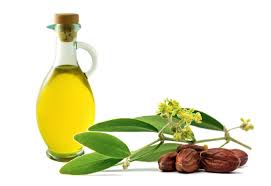
Jojoba – Base/Carrier, although technically it is not one of the oils, but actually a wax (& thus used by me to help my hair stay curly & frizz-free naturally)
Oil Types
Carrier/Base Oils
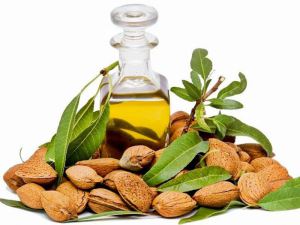
Sweet Almond – another one of the many base/carrier oils available & a favourite of this aromatherapist
Carrier oils are used as the main or base (hence the name) oil of a blend into which other oils can be added. They are safe to use undiluted & are usually lighter with a relatively mild (or no) scent. They are higher yield (you get a lot of oil during production) which means that they are available at a reasonable cost. They are therefore safe & practical to use in larger quantities & to dilute other oils, particularly essential oils & absolutes, to make them safe to apply to the skin in massage & aromatherapy. The name derives from their being used to carry these oils to the skin or to act as a base oil of a blend to which others can be added.
Origin: usually derived from fruit, herbs, vegetables, seeds & nuts
Examples: Sweet Almond, Coconut, Grapeseed, Olive, Sunflower Seed, Wheatgerm
Enricher Oils
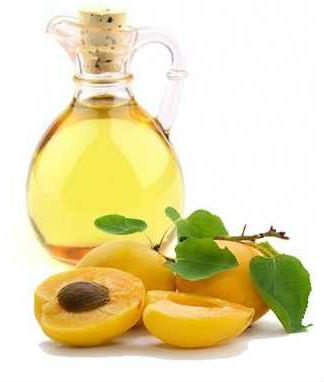
Apricot Kernel – one of the lighter Enricher oils
Enricher oils, as their name suggests, are usually much richer oils. They are lower yield & thus more expensive, luxurious oils. As such they are not normally used as a carrier/base oil but are added in smaller quantities to enrich an overall blend.
Origin: usually derived from fruit, herbs, vegetables, seeds & nuts
Examples: Apricot Kernel, Argan, Avocado, Buruti, Carrot-macerated, Evening Primrose, Rosehip Seed, St. John’s Wort macerated, Vitamin E
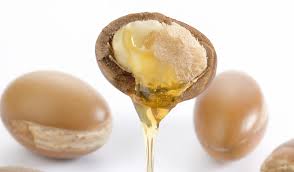
A little luxury goes a long way with an enricher such as Argan Oil
Essential Oils & Absolutes
These are highly concentrated natural oils derived from a range of specific plants, & with a specific chemistry, characteristics, properties, functions & scent associated with the plant. Whether they are called essential oils or absolutes depends on the process by which the oil is extracted from the plant.
Origin: derived from fruit, seed, leaf, twig, bark, wood, rhizome, root or flower.
Essential Oil
To be called essential the oil must be extracted by steam/water distillation or cold expression
Examples: Rose otto, Mandarin, Clove Bud, Frankincense, Geranium
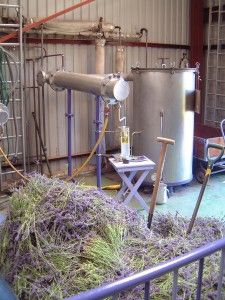
Lavender is one of the Essential Oils because it is produced in distilleries such as this one by the steam/water distillation extraction method
Absolute Oil
Absolutes are extracted by any other method, traditionally by enfleurage or hot expression. In more modern methods, solvent & CO2 extraction.
Examples: Rose absolute, Jasmine absolute
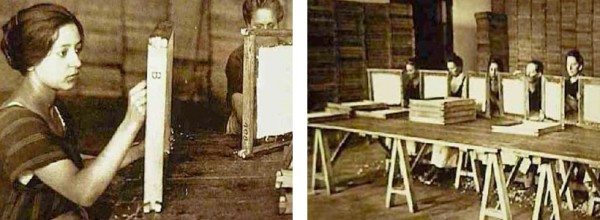
Enfleurage is a traditional method of extraction used to obtain Absolute oils from delicate flowers more easily damaged by other methods. It is carried out by hand & is highly labour intensive
When is an oil not an oil? – Distillate Waters
Co-Product Friends

Distillate waters are a co-product with Essential oils of the distillation of plant matter
These are produced when a plant is steam/water distilled – which results in essential oil & distillate water. Although with the growth of essential oil production in the 18th – 20th centuries this water was increasingly seen as a mere by-product, in the past the water was also highly-prized for containing the active principles & aromatic essences of the plant together with minute droplets of essential oil. It also has an associated scent, although it can often be quite different from the smell of the essential oil. I use them extensively myself as a natural toner, gentle eye make-up remover & in my handmade products.
The Name Game
Traditionally, steam/water distillation was used with flowers such as Rose, Jasmine & Lavender, & so all distillate waters were known by the much more attractive name of Flower or Floral waters. Today they are seen as aromatic co-products & are often the principal commodity, with as many types available as can be produced by this method of distillation & now even other extraction types (see safety note below). An equally bewildering variety of names are now used as a result, including Hydrosol, Hydrolat & Hydrolate.
Origin & Examples: flowers e.g. Rose, Neroli/Orange flower, bark e.g. Frankincense, leaves e.g. Peppermint, Rosemary, fruit, seed, twig, wood, rhizome & root.
Safety Note: The term floral water can be applied to any kind of water mixed with essential oil, alcohol & even synthetic chemicals. Always check the ingredients to ensure a naturally-produced & pure product. Care must be taken when buying distillate waters from plants that are usually extracted by solvents as traces can remain.

Rose distillate water, traditionally (& more beautifully) called Rosewater, is produced together with Rose otto essential oil when Rose petals are steam & water distilled
Production Methods of Oils
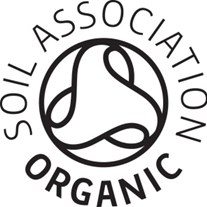
The Soil Association logo guarantees that a product is organic
Organic
Produced with organic farming methods – produced without the use of chemical fertilizers, pesticides, or other artificial chemicals. If in doubt, look for the soil association organic label, but good producers should always state if organic on the website, description or packaging.
Non-Organic
The opposite of the above – produced with the use of chemical fertilizers, pesticides, or other artificial chemicals.
Unrefined
Unrefined oils are produced with the minimum of heat during their processing (usually cold or expeller pressed). They are more natural & are not bleached or altered (such as perfumed or deodorixed) after extraction.
Refined
Refined oils are more likely to have been processed with heat during extraction. They will have been altered after extraction; for example, bleached, perfumed or deodorized e.g. a scented coconut oil like Moni
Virgin
Truly cold-pressed, a virgin oil will have had no heat at all during processing.
Raw
A product which is in a pure or near natural state.
Extraction Methods of Oils
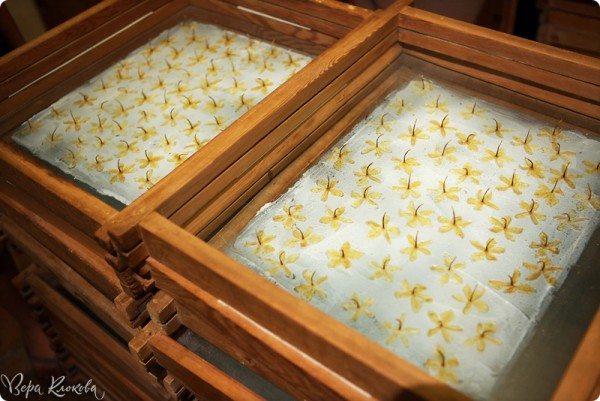
Jasmine is an Absolute – produced by the process of cold enfleurage. Here we see the flowers set in animal fat on a ‘chassis’, the resultant ‘pomade’ will be saturated with oils from the flowers
Enfleurage
A traditional method of extracting the absolute from plants using odourless fats (usually animal-derived).
Plant part: flowers, especially delicate e.g. Rose, Jasmine, Neroli/Orange flower.
There are two types:
Cold Enfleurage
Flowers or petals are set into cold animal fat on a chassis (a large framed plate of glass) & their scent allowed to diffuse into the fat over 1-3 days. The process is repeated until the fat, now known as a pomade, is saturated.
Hot Enfleurage
Flowers or petals are stirred into hot, melted fats & repeatedly strained & added until the pomade is fully-saturated.
Steam/Water Distillation
The plant matter is either boiled in water, processed in a mixture of water & steam or has pure steam passed through it. As it is heated the plant parts distill into distillate water & essential oil.
Plant part: leaves, twigs, bark, rhizomes, roots, sturdy flowers e.g. Lavender, Clove Bud, Bay Laurel
Mechanical Extraction
This method uses mechanical machines (usually presses) to extract the plant absolute/essential oil (as opposed to hand produced/non-mechanical)
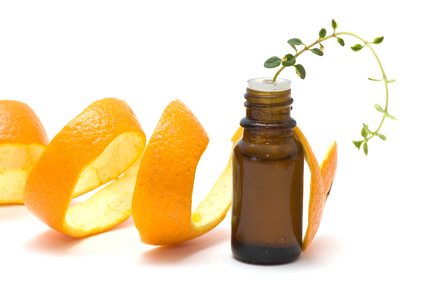
Orange oil is derived via expression – literally extracted from the rind. Just peel one yourself to try it
Expression
One of the simplest methods – the oil is removed from the skin of the fruit (usually citrus) by rasping (think of zesting a lemon during cooking). This is usually by an expeller press, which means that there is no external heat involved although heat may be produced naturally through friction.
Plant part: rind/skin of fruits, usually citrus e.g. Lemon, Lime, Orange, Grapefruit
Expeller Pressed
Using a mechanical press to ‘squeeze’ the oil without any form of external heat or chemicals.
Plant part: fruits, seeds, nuts e.g. Avocado, Apricot-Kernel, Olive, Walnut
Safety Note: the method may produce heat naturally through friction.
Cold Pressed
These oils will have been expeller extracted in a controlled temperature setting. However, the heat is never from an outside source & to be considered cold pressed can never be above 120°F/49°C.
Plant part: fruits, seeds, nuts e.g. Avocado, Apricot-Kernel, Olive, Walnut
Safety Note: Despite the name cold pressing may produce heat naturally through friction.
Solvent Extraction
A solvent (typically hexane) is used to extract the essential oil from the plant & is then itself removed. The advantages are that it can be done at low temperature, produce much higher yields, especially in plants where the oil yield is typically low e.g. Melissa (Lemon Balm) or the plant part is delicate & easily-damaged e.g. Jasmine. Also the oil remains chemically very similar.
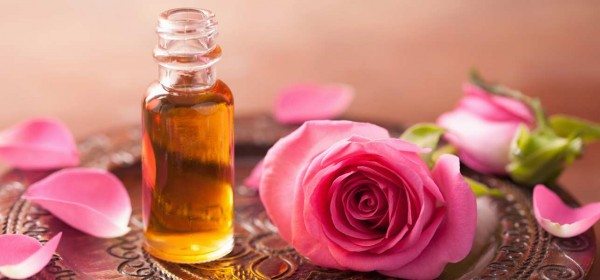 Rose (Rosa damascena or centifolia)
Rose (Rosa damascena or centifolia)
Rose is an excellent example here: just compare Rose otto (steam distilled) & Rose absolute (solvent extracted) where the former has a honey-sweet scent quite dissimilar to a traditional Rose smell – this is because the steam distillation actually alters it chemically, whilst the latter smells very much like a Rose from your garden as the chemistry barely changes. Steam distillation of Rose otto can require a colossal 8,000kg of Rose petals to produce 1kg of oil & typically costs £40-80/2.5mls (45 drops) – compare this to Rose absolute, because the yield is much higher it usually costs £18-25/2.5mls (45 drops).
Safety Note: There are concerns around the general use of solvents & trace elements of them remaining in the oils that they produce.
CO2 Extraction
Carbon dioxide/CO2 is put under pressure & heated until supercritical & then used to extract the oil. The advantages are that it is still at a very low temperature (88.0 °F/31.1 °C) that doesn’t affect the oil; chemically the oil remains virtually unchanged e.g. A’kin Rosehip seed oil, & that as it reverts back to a gas it leaves no trace or residue. However, as the equipment is extremely expensive the method is more rarely used & the final product usually more expensive to buy.

Rosa Centofolia
Audience Participation
Have I missed something? More than likely! What started as a small article to be helpful has snowballed somewhat. Naturally, this isn’t an exhaustive list & I will continue to add to it myself. Still, by all means feel free to join in.

